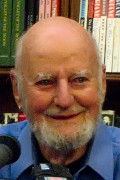Beat Generation
The Beat Generation was a literary movement that emerged in the 1950s among a group of authors whose work explored and influenced American culture and politics in the post-World War II era. The bulk of their work was published and popularized throughout the 1950s. Central elements of Beat culture included a rejection of standard narrative values, the exploration of religion, the embrace of drug experimentation, the quest for freedom of expression, and the desire for sexual liberation. The members of the Beat Generation developed a reputation as new bohemian hedonists, who celebrated non-conformity and spontaneous creativity.
Origins and History[edit | edit source]
The origins of the Beat Generation can be traced back to a meeting between Jack Kerouac, Allen Ginsberg, and William S. Burroughs in New York City in the 1940s. They were later joined by Neal Cassady, Gregory Corso, and Herbert Huncke, among others. The term "Beat" was introduced by Kerouac in the late 1940s, intending it to mean "weary" but also "upbeat" and "beatific."
The Beat Generation gained national fame in 1956 with the publication of Ginsberg's poem Howl, which was subject to an obscenity trial due to its explicit content. Kerouac's novel On the Road (1957), based on the travels of Kerouac and his friends across America, is often considered the defining work of the Beat Generation. It captured the spirit of freedom and the quest for authenticity that characterized the movement.
Key Themes and Influences[edit | edit source]
The Beat Generation was heavily influenced by the disillusionment of its members with the conventional values of middle-class American society. The movement was characterized by its rejection of materialism, traditional morality, and rigid societal norms. Influences included a mix of Eastern religions, Romanticism, modernist literature, and the experiences of the authors during World War II.
The Beats were also influenced by jazz music, which they saw as an expression of genuine creativity and spontaneity. This appreciation for improvisation was reflected in the writing style of Beat literature, which often featured a free-flowing, stream-of-consciousness approach.
Legacy[edit | edit source]
The Beat Generation had a lasting impact on the culture of the United States and the world. It paved the way for the countercultural movements of the 1960s, including the Civil Rights Movement, the Sexual Revolution, and the Anti-Vietnam War Movement. The Beats influenced a wide range of music, from the folk revival of the early 1960s to the rock music of the late 1960s and beyond.
In literature, the Beat Generation opened up new possibilities for expression and laid the groundwork for postmodern literature. The movement also had a significant impact on the visual arts, film, and the general perception of the artist in society.
Notable Figures[edit | edit source]
- Jack Kerouac: Author of On the Road, Kerouac is often considered the father of the Beat Generation.
- Allen Ginsberg: Poet best known for Howl, a seminal work that defied conventional norms and censorship.
- William S. Burroughs: Author of Naked Lunch, a groundbreaking novel that was also subject to an obscenity trial.
- Neal Cassady: The inspiration for the character Dean Moriarty in On the Road, Cassady was a key figure in both the Beat Generation and the psychedelic movement of the 1960s.
See Also[edit | edit source]
This article is a literature-related stub. You can help WikiMD by expanding it!
Search WikiMD
Ad.Tired of being Overweight? Try W8MD's physician weight loss program.
Semaglutide (Ozempic / Wegovy and Tirzepatide (Mounjaro / Zepbound) available.
Advertise on WikiMD
|
WikiMD's Wellness Encyclopedia |
| Let Food Be Thy Medicine Medicine Thy Food - Hippocrates |
Translate this page: - East Asian
中文,
日本,
한국어,
South Asian
हिन्दी,
தமிழ்,
తెలుగు,
Urdu,
ಕನ್ನಡ,
Southeast Asian
Indonesian,
Vietnamese,
Thai,
မြန်မာဘာသာ,
বাংলা
European
español,
Deutsch,
français,
Greek,
português do Brasil,
polski,
română,
русский,
Nederlands,
norsk,
svenska,
suomi,
Italian
Middle Eastern & African
عربى,
Turkish,
Persian,
Hebrew,
Afrikaans,
isiZulu,
Kiswahili,
Other
Bulgarian,
Hungarian,
Czech,
Swedish,
മലയാളം,
मराठी,
ਪੰਜਾਬੀ,
ગુજરાતી,
Portuguese,
Ukrainian
Medical Disclaimer: WikiMD is not a substitute for professional medical advice. The information on WikiMD is provided as an information resource only, may be incorrect, outdated or misleading, and is not to be used or relied on for any diagnostic or treatment purposes. Please consult your health care provider before making any healthcare decisions or for guidance about a specific medical condition. WikiMD expressly disclaims responsibility, and shall have no liability, for any damages, loss, injury, or liability whatsoever suffered as a result of your reliance on the information contained in this site. By visiting this site you agree to the foregoing terms and conditions, which may from time to time be changed or supplemented by WikiMD. If you do not agree to the foregoing terms and conditions, you should not enter or use this site. See full disclaimer.
Credits:Most images are courtesy of Wikimedia commons, and templates, categories Wikipedia, licensed under CC BY SA or similar.
Contributors: Prab R. Tumpati, MD


